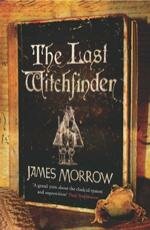

The Last Witchfinder by James Morrow
Reviewed by Dave M. Roberts
Weidenfeld & Nicolson, London, 2006, 494pp, £12.99, h/b, ISBN 0-297-85258-2
It is now almost seven years since James Morrow completed his Godhead Trilogy, which took on the death of God and its implications as its subject matter. The Last Witchfinder, his first novel since then, is no less ambitious, taking on the battle between scientific reason and superstition and fear of the unknown.
The witchfinding mania that blighted Europe and America was taking place during the seventeenth and early eighteenth centuries, roughly the same period as the birth of modern science, and it can be seen that the rise of the age of reason was instrumental in bringing to a halt this practice, which had its roots in superstition. The Last Witchfinder follows the life of Jennet Stearne, who as a young child sees her aunt burnt as a witch by her father because of the natural philosophy experiments she is doing. That these experiments were intended to find a scientific proof of witchcraft made no difference. Jennet is then fixed upon overturning the Witchcraft Act of 1604 that was used to justify the trials. Inspired by a letter from Isaac Newton, which implies he has a proof that demons exist only in the mind, she determines to do this by developing a disproof of witchcraft based on the principles of Natural Philosophy, an Argumentum Grande that could not be gainsaid in an age of reason. Her life can only be described as extraordinary. She is variously shipped out from England to the New World, witnesses the Salem Witch Trials, lives with Indians after her village is raided, undertakes a marriage of convenience, becomes romantically involved with Ben Franklin, being shipwrecked and eventually puts herself on trial as a witch in order to prove her refutation of the existence of witches. Jennet's brother takes the opposite course, taking over from his father as Witchfinder Royal and becoming a spur to Jennet as he undertakes to purge the New World of witches.
There is a significant cast of real historical figures, whose role is much expanded by our knowledge of these people and what they stood for. We are reminded, for example, that while Newton was the father of modern science and the champion of reason, he never abandoned his religion. The juvenile feud between Newton and Robert Hooke can be seen as triggering the events of the book, the unreasonable behaviour eventually leading to the spirited defence of reason. The historical characters are not there merely as place-markers, but as real people loaded with historical and intellectual resonance. The climactic trial, with Reverend Samuel Parris and Abigail Williams from the Salem witch trials acting for the prosecution, becomes a recasting and re-examination of those trials. With a substantial legal defence from Baron de Montesquieu, this allows for the possibility that the trial could become a real debate and confrontation between reason and superstition.
The story of Jennet's life is narrated not by the author James Morrow, but by Isaac Newton's Principia Mathematica. This narration shines a light on a whole new world of books, existing as intelligent entities existing separately from their physical manifestations. Their world is constantly in conflict, with books opposed to one another. Most specifically, The Principia is in a constant battle with The Malleus Maleficarum, otherwise known as The Hammer of the Witches, the most influential treatise on witchfinding and so the Principia's mortal enemy. As the Maleficarum is an attempt at a rationalised approach to witchfinding, it suggests that the objection is less that witchfinding is born of superstition, as might be expected, but that it uses a spurious science to justify itself. Satan places a witchmark on his followers that will not bleed, so finding a blemish on a victim that doesn't bleed when pricked proves guilt, fresh water cannot abide a witch, so if a victim floats they must be a witch. Faith is not the problem for the Principia, it is this misappropriation of scientific principle to justify an end. In the telling of the story there are numerous shifts where the narrative moves from telling Jennet's story to an aside from The Principia expounding on some point. These are presented in such a way, embedded in the flow of the narrative, that the reader is constantly being reminded of who is telling this tale, and that what we are being told is not as simple as a straight conflict between reason and superstition.
The Last Witchfinder is a magnificent combination of high entertainment and intellectually demanding story telling. The life and travails of Jennet prove to be compelling; the tale fair gallops along and is packed with incident as well as engaging and intriguing characters. It is a tremendously satisfying read, which offers much to be considered long after the book is finished. Has it been worth the seven-year wait? Damn right it has.
This article first appeared in Vector 248. Back issues of Vector are available from
